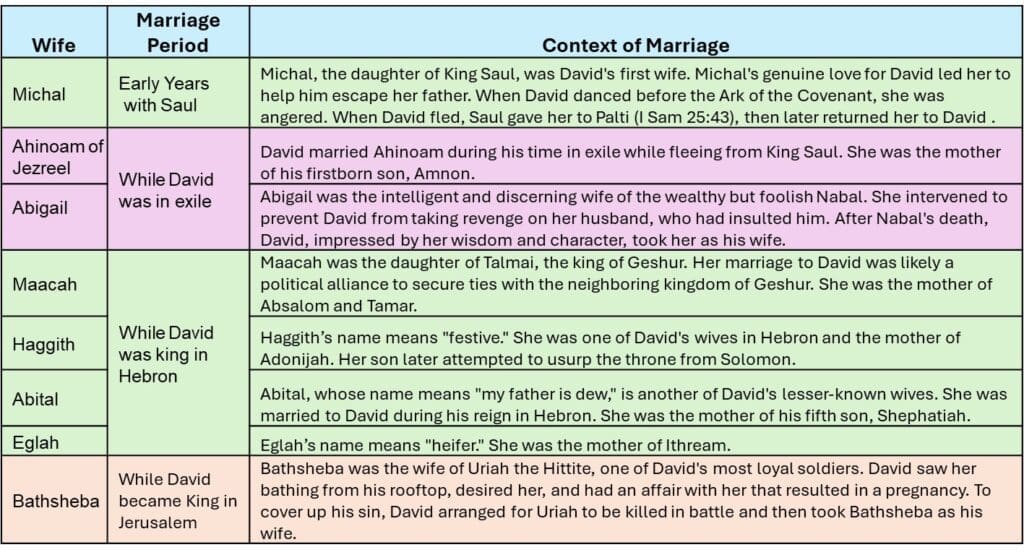Wisdom Wednesday: Wisdom of David -Part 4
David’s Foolish Failures
Submitted by Debbie’s Dad
“Create in me a clean heart, O God, And renew a steadfast spirit within me.
Do not cast me away from Your presence And do not take Your Holy Spirit from me.
Restore to me the joy of Your salvation And sustain me with a willing spirit.
Then I will teach transgressors Your ways, And sinners will be converted to You.”
(Ps 51:10–13) NASB 95)
While we have been examining the clear evidence of David’s wisdom in revering and following God’s way in prior weeks, we now turn to look at the times that David exhibited behaviors that were not wise, but downright foolish. The Bible calls this folly – the rejection of wisdom and wise instruction, instead doing what seems right from your own perspective (Prov. 1:7; 12:15), effectively saying there is no God in the heart (Psa. 14:1).
We study this not to tarnish David’s reputation as wise, but to show he was, like us, a flawed human with a sinful nature susceptible to walk astray. And David did.
The passage above is from David’s prayer of repentance after his most famous sinful excursion from walking with God – his sinful adultery with Bathsheba, and ordering the effective murder of her husband, Uriah (2 Sam 11:3-17; 12: 9,10). This tragic moral lapse is well-known, but not the only cases where David’s behavior was folly.
We examine these occasions using the guidance from John in his first epistle: “Do not love the world nor the things in the world. If anyone loves the world, the love of the Father is not in him. For all that is in the world, the lust of the flesh and the lust of the eyes and the boastful pride of life, is not from the Father, but is from the world.” (1 Jn 2:15–16). While these three areas of moral failure are often combined, we look at examples in David’s life where he sought the things of the world around him, rather than following God’s instruction.
- Lust of the Eyes – As a king, David accumulated wives, yielding to the polygamy of neighboring nations whose kings demonstrated power by wives and many children to carry on the monarchy. His wives (See chart below) included women that established alliances with powerful neighboring kingdoms. It is noted that in his years as king in Hebron he had six sons from six of his wives (2 Sam. 3:2-5; 5:13-14), though this was explicitly prohibited in the Law, “[The king] shall not multiply wives for himself, or else his heart will turn away; nor shall he greatly increase silver and gold for himself.” (See Deut. 17:14-17) In addition to wives, David sought the comfort and physical trappings that come with being a king – silver and gold.

- Pride of Life – This is the desire for status, possessions, and achievements of the world. Commentators note with interest that David’s first recorded words are those to the soldiers watching the threats from the Philistine giant, Goliath. David asked, … “What will be done for the man who kills this Philistine and takes away the reproach from Israel? For who is this uncircumcised Philistine, that he should taunt the armies of the living God?” (1 Samuel 17:26) David was asking about the reward – what was in it for him. This may have been a glimpse into an emerging pride that then blossomed as his popularity angered Saul (1 Sam. 18:6-9) and as he married into King Saul’s royal family to gain status. (1 Sam. 18) David’s great military leadership was recognized, and he gained silver and gold treasures from the subdued nations as a show of his power. (2 Sam.8, esp. 10-11) On occasions David acted deceitfully jeopardizing others (1 Sam 21-22) and behaved rashly and vindictively. (1 Sam 25:21-22)
- Lust of the Flesh – In the sin with Bathsheba, David succumbed to the sexual desires of his physical body and mind. And this led to lying, deceit, and ultimately to commanding the murder of Bathsheba’s husband – all to protect David’s pride, position, possessions and stature.
As David’s son, Solomon, would later write, “A man’s pride will bring him low, But a humble spirit will obtain honor.” Prov. (29:23) David’s pride and desires brought him very low, humiliating Him before God and the nation, but he repented in humility and the writers of Kings and Chronicles, still regarded his wisdom.
We are all subject to the attractions of the world – how much more was David subject to these as a royal king! David was at his wisest when being threatened by Saul and writing Psalms of his total dependence on God alone. Let us learn from David’s life – his wisdom and the pain of his detours into folly.